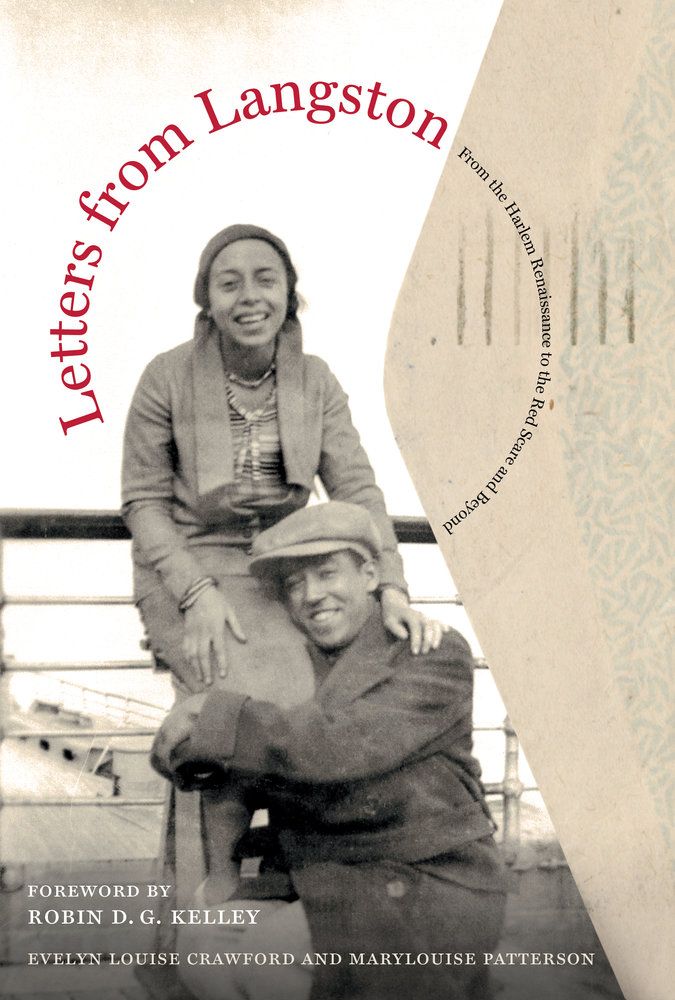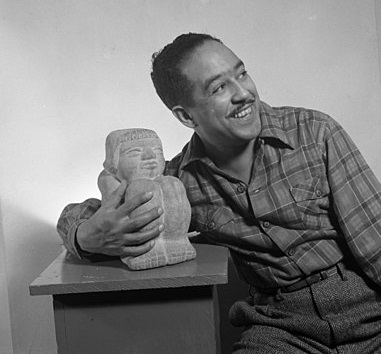 Although there are several books of correspondence between Langston Hughes and his contemporaries, none so far have closely explored Langston’s politics, from the early 1930s to his death in 1967. Letters from Langston, edited by Evelyn Louise Crawford and MaryLouise Patterson collects letters, postcards, and telegrams between Langston Hughes, Louise Thompson Patterson, William L. Patterson, Matt N. Crawford, and Evelyn “Nebby” Graves Crawford. Below are several excerpts from the book.
Although there are several books of correspondence between Langston Hughes and his contemporaries, none so far have closely explored Langston’s politics, from the early 1930s to his death in 1967. Letters from Langston, edited by Evelyn Louise Crawford and MaryLouise Patterson collects letters, postcards, and telegrams between Langston Hughes, Louise Thompson Patterson, William L. Patterson, Matt N. Crawford, and Evelyn “Nebby” Graves Crawford. Below are several excerpts from the book.
Our parents enjoyed a relationship with Langston that lasted over forty years, and they also had abiding friendships with one another that, in some instances, stretched for eight decades. The five shared many family experiences and a burgeoning intellectual and political curiosity, mostly focused on race and liberation. All of them came of age in a radical historical period marked by the Bolshevik Revolution of 1917, the execution of Sacco and Vanzetti, the labor upheavals of the Great Depression, and the rise and defeat of fascism. It was a time bubbling over with an intensity, energy, creativity, and promise that came in the wake of a new revolutionary movement.
By 1932 Louise was working with the Communist party and other leftists in Harlem. She had been recruited to create a committee to support a film about Negro life in the United States, to be produced in Moscow. Its working title was Black and White. Some time in late March or early April 1932, Langston had agreed to have his name added to the committee.

FROM LOUISE TO LANGSTON, APRIL 24, 1932
April 24, 1932
My Dear Lang:
I am awaiting eagerly news of your various escapades in the land of sunshine, frameups and red terrorism. I look forward any day to seeing notice in the paper that Capt. Hynes and his brave boys have yanked you off the platform in the midst of a tirade on Scottsboro or Tom Mooney. Or are you doing the straight society act? Hope not.
But the purpose of this letter is to let you know how the Cooperating Committee is or is not cooperating. We have about given up on the idea of raising any money to pay the passage of people who may wish to go but have not the wherewithal and are concentrating on those who want to go and can pay their own way. There are several interested in this way and Ford says that he will send along the number that can go and let them recruit others in Europe.
So he asked me to write you about your going. Will you go in case there are only a few and when will you be ready to go? The same conditions hold, of course, and your own plans can be worked out as you have planned then. Also, have you run across anyone who wants to go and will pay his, or her, own way? What about Loren?
Write me as soon as you can, please, and let me know [y]our plans. I do wish that I was out there with you now. I had a letter from Nebby yesterday and she told me that they were looking forward to seeing you up north.
Remember me to all—friend or foe.
Always your pal,
Lou—ise
Langston did go on the trip to the U.S.S.R., and even though the plans for the film had fallen through, the group did tour the country.

TO MATT FROM LANGSTON, JUNE 23, 1944
LENIN
by
Langston Hughes
Lenin walks around the world.
Frontiers cannot bar him.
Neither barracks nor barricades impede.
Nor does barbed wire scar him.
Lenin walks around the world.
Black, brown, and white receive him.
Language is no barrier.
The strangest tongues believe him.
Lenin walks around the world.
The sun sets like a scar.
Between the darkness and the dawn
Rises a red star.
[Note below poem] Man, I have been to St. Louis, Detroit, Chicago, as Narrator for the Music Festivals. Travelling with maestros and prima donnas!!! Sure did!
Lang
6/23/44
Letters from Langston begins in 1930 and ends shortly before his death in 1967, providing a window into a unique, self-created world where Hughes lived at ease. This distinctive volume collects the stories of Hughes and his friends in an era of uncertainty and reveals their visions of an idealized world—one without hunger, war, racism, and class oppression.
Evelyn Louise Crawford, a retired arts administrator and consultant, and MaryLouise Patterson, a pediatrician in clinical practice, are the daughters of Langston Hughes’s cherished friends Evelyn Graves Crawford, Matt N. Crawford, Louise Thompson Patterson, and William L. Patterson. Hughes was a frequent guest in the homes of the two families and was like an uncle to Evelyn Louise and MaryLouise.

